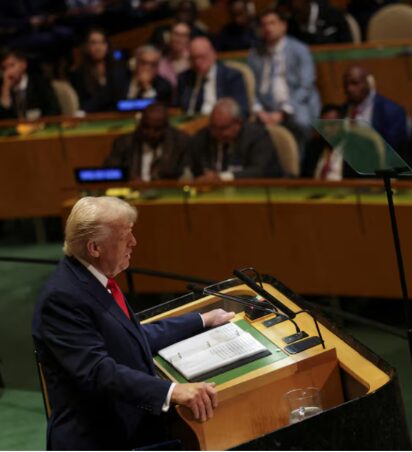In a moment that reverberated across global headlines, President Donald Trump announced at the United Nations General Assembly that Ukraine can and should reclaim all of its lost territory — including Crimea. This declaration, framed against the symbolic backdrop of the UN’s 80th anniversary, marked a striking departure from Trump’s earlier calls for negotiation and compromise. It also reignited debates about the future of NATO, the durability of Russia’s position, and whether U.S. foreign policy is on the verge of a dramatic recalibration.
The Remark That Shocked the Hall
When Trump met Ukrainian President Volodymyr Zelenskyy on the sidelines of the General Assembly, few expected the rhetoric that followed. Trump referred to Russia as a “paper tiger,” a once-feared adversary now hollowed out by prolonged war and economic sanctions. He went further still, urging NATO allies to take tougher measures — including the use of air defense systems to shoot down Russian aircraft violating allied airspace.
It was a bold proclamation, one that seemed to catch even some members of Trump’s own foreign policy team by surprise. After all, this was the same man who, in earlier months, suggested that a deal with Russia might be the pragmatic solution to ending the war. His previous language emphasized negotiated settlements, with Crimea often floated as a potential bargaining chip. Now, that logic appeared to be completely reversed.
Why the Rhetorical Pivot Matters
For Ukraine, Trump’s words were more than just symbolic support. They suggested the possibility of full international backing for reclaiming territory that Russia has occupied for years. Crimea, annexed by Moscow in 2014, has long been considered a nearly impossible goal to recover. Even some of Kyiv’s most ardent supporters in Europe and Washington had tacitly accepted that reclaiming Crimea could provoke catastrophic escalation.
By declaring that Ukraine can recover everything — from the Donbas to Crimea — Trump crossed into new rhetorical territory. The pivot matters for several reasons:
-
Signals to NATO Allies – Trump’s statement pressures European nations to increase both military and financial aid to Kyiv. If Washington endorses a maximalist Ukrainian victory, hesitation in Berlin, Paris, or Brussels could appear out of step.
-
Reassurance to Kyiv – For Zelenskyy, who has faced wavering international support as the war drags on, the public endorsement offers renewed leverage. Ukrainian leaders have long argued that piecemeal compromises only embolden Moscow.
-
Message to Moscow – Calling Russia a “paper tiger” is no small provocation. It frames the Kremlin not as a formidable adversary but as a faltering power, undermining its narrative of resilience.
The Shadow of Crimea
Crimea sits at the heart of this rhetorical storm. For Russia, the peninsula is not simply territory; it is symbolic, strategic, and deeply tied to Vladimir Putin’s legacy. Sevastopol’s naval base anchors Russia’s Black Sea fleet, and Moscow has poured billions into fortifying its hold since annexation.
For Ukraine, Crimea is equally symbolic. It represents the first wound inflicted by Moscow and the original failure of the international community to enforce red lines. Reclaiming it would not only restore sovereignty but also reverse what many Ukrainians see as a betrayal by the world.
Trump’s statement that Crimea is winnable throws this delicate balance into chaos. Strategists warn that endorsing its return could escalate Russia’s use of unconventional weapons or deepen its partnership with countries like Iran and North Korea. Yet for Ukrainian citizens, the message is intoxicating: after years of hearing Crimea might be “lost forever,” a major power is saying it is within reach.
The “Paper Tiger” Label
By calling Russia a “paper tiger,” Trump employed language designed to puncture Moscow’s aura of strength. The phrase suggests a state that projects intimidation but lacks real power to enforce its threats.
From a military perspective, there is evidence that Russia’s prolonged war has strained its capabilities. Casualty counts are staggering, military equipment losses are mounting, and sanctions have bitten into industrial production. Still, critics argue that to call Russia hollow underestimates its enduring nuclear arsenal and its capacity to wage destructive conventional war.
Yet Trump’s framing matters less for its accuracy than for its impact. Labels shape narratives, and narratives shape policy. If Russia is portrayed as weak and faltering, Western publics may be more willing to support stronger measures.
NATO and the Question of Escalation
Trump’s call for NATO members to shoot down Russian aircraft violating their airspace underscores how serious the alliance’s deterrence strategy has become. While NATO has long scrambled fighters in response to incursions, authorizing shootdowns would be a leap into direct confrontation.
European governments remain wary. Nations such as Germany and Italy fear that escalation risks nuclear retaliation or further destabilization of energy markets. Poland and the Baltic states, however, may welcome the tougher stance, seeing it as overdue protection against Russian intimidation.
NATO is no stranger to managing risk. But Trump’s language complicates its careful balancing act. If Washington’s leader declares that maximal measures are necessary, how long can European capitals maintain more cautious strategies?
Trump’s History with Russia and Ukraine
The irony of Trump’s rhetorical shift is hard to miss. Throughout his political career, he has often been accused of being too soft on Russia. From questioning NATO’s relevance to expressing admiration for Vladimir Putin, Trump’s foreign policy instincts have frequently leaned toward disengagement rather than confrontation.
His earlier suggestions that Ukraine might have to “give up some land for peace” seemed consistent with this pragmatic streak. That’s what makes his current declaration so startling. It raises questions:
-
Is this a genuine change of heart, shaped by new intelligence or geopolitical realities?
-
Or is it a rhetorical maneuver designed to seize headlines and reframe himself as a defender of Western resolve?
Political observers note that Trump’s shifts often align with audience and context. Speaking at the UN, with world leaders watching and Zelenskyy at his side, the incentives for tough talk were high.
Kyiv’s Reception
For Ukraine, Trump’s words are manna from heaven. Zelenskyy has repeatedly urged Western leaders to endorse not just defense but complete victory. The notion of “territorial concessions” has been anathema in Kyiv, viewed as rewarding aggression.
Hearing a U.S. president declare that everything, including Crimea, can be reclaimed is both validation and a tool for leverage. Zelenskyy can now argue to European leaders that America is fully behind maximalist goals — so why should they hold back?
Yet beneath the optimism lies realism. Ukraine still faces immense challenges: manpower shortages, strained infrastructure, and the relentless bombardment of energy grids. Words alone will not liberate cities. Kyiv will judge the statement’s value not by rhetoric but by whether it translates into more weapons, more funding, and more diplomatic muscle.
Moscow’s Reaction
Predictably, the Kremlin dismissed Trump’s remarks as fantasy. Officials doubled down on claims that Crimea and other occupied territories are “forever Russian.” State media ridiculed the “paper tiger” label, portraying Trump as misinformed or pandering to his audience.
But behind the bluster, there may be unease. Russia has long relied on divisions within the West to sustain its campaign. If Trump — often seen as more skeptical of NATO commitments — now embraces maximalist Ukrainian goals, that unity could harden.
Kremlin insiders may fear that Western resolve is not weakening as they hoped, but recalibrating toward more aggressive stances.
The Global Ripple Effect
Trump’s statement is not only about Russia and Ukraine. It reverberates across global geopolitics:
-
China is watching closely. Beijing, which has deepened ties with Moscow, may interpret Trump’s words as a preview of how Washington would respond to aggression in Taiwan.
-
The Middle East is unsettled. Iran, already under renewed UN sanctions, may fear that Western rhetoric is turning more hawkish overall.
-
Developing nations face pressure to choose sides. As Western leaders frame the conflict as a fight between democracy and authoritarianism, neutrality becomes harder to maintain.
In short, one statement in New York echoes from Warsaw to Beijing to Tehran.
Critics and Skeptics
Not everyone is convinced by Trump’s newfound hawkishness. Critics argue that the statement may be more theater than policy. They point out that Trump has often shifted positions dramatically, only to backtrack later. Others worry that bold rhetoric without a clear plan risks raising expectations in Ukraine while delivering little.
Policy experts stress that reclaiming Crimea would be a monumental military challenge, requiring not only unprecedented Western support but also risks of direct NATO involvement. Declaring it possible, they argue, may set the stage for disappointment if reality proves harsher.
Could This Signal a Policy Shift?
The key question remains: is this rhetoric or roadmap?
If it is merely rhetorical, Trump’s words will soon fade from headlines, leaving little lasting impact. If, however, his administration follows through with tangible policy shifts — increased arms shipments, expanded sanctions, diplomatic campaigns to isolate Moscow — then this could mark a turning point in the war.
For now, the answer is unclear. Washington remains divided, with some lawmakers pushing for greater support and others warning against “forever wars.” The Pentagon faces its own constraints, balancing commitments in Europe, Asia, and the Middle East.
The Stakes Ahead
The war in Ukraine is not just about borders. It is about the shape of the international order. Will aggression be rewarded or punished? Will alliances hold firm or fracture under pressure? Will smaller nations trust that their sovereignty matters in a world dominated by great powers?
Trump’s statement that Ukraine can reclaim all lost territory crystallizes these stakes. It declares that compromise is no longer acceptable, that victory is not only possible but necessary. Whether this is a genuine policy shift or a rhetorical flourish, it has already altered the conversation.
Conclusion: From Negotiation to Victory?
The image of Trump standing beside Zelenskyy and declaring Russia a “paper tiger” may come to symbolize a new phase of the conflict. It is a phase where maximalist goals are spoken aloud, where Crimea is no longer whispered as a bargaining chip but shouted as a rightful objective.
For Ukraine, the words bring hope. For Russia, they bring defiance. For NATO, they bring risk. And for the world, they bring the reminder that in geopolitics, language is never just language — it is strategy, signal, and sometimes prophecy.
The coming months will reveal whether Trump’s declaration becomes policy or fades as rhetoric. But one thing is certain: the war in Ukraine has entered a new rhetorical chapter, and the world is watching closely to see how the story unfolds.

